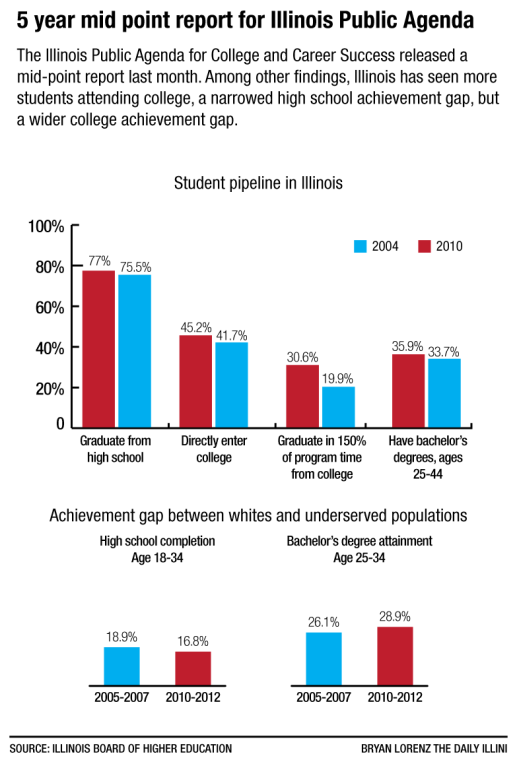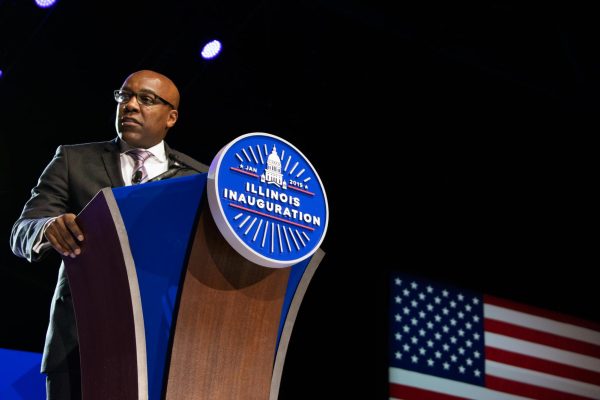Illinois evaluates educational reform progress made over the past five years
May 7, 2014
Five years ago, the Illinois Board of Higher Education decided to formulate a master plan to significantly reform education across the state, launching the Illinois Public Agenda for College and Career Success. Now halfway through the ten-year program, the board released a report on April 1, reviewing the state of progress made thus far.
The 2008 agenda included a multitude of goals for the state, such as closing the achievement gap, lowering the student dropout rate, improving adult education and making college more affordable, among other goals.
Candace Mueller, spokeswoman for the Illinois Board of Higher Education, discussed the background of the agenda.
In 2007, the Illinois General Assembly passed House Joint Resolution 69 which recommended that the Illinois Board of Higher Education perform a study to examine educational policy issues throughout the state. That resolution was, in part, what led to the Illinois Public Agenda for College and Career Success.
Sarah Rens, executive chair of the Student Advisory Committee for the Illinois Board of Higher Education, commented on the objectives included in the Public Agenda.
Get The Daily Illini in your inbox!
“They set extremely ambitious goals back in 2008,” Rens said. “And so I think that progress takes time, and I think they are doing everything they can to make the progress that they set out to do.”
One of the most successful aspects of the public agenda was the fact that the adult education level in Illinois increased at a rate faster than the rest of the country over the past five years.
The mid-program report also examined the K-20 pipeline, which is a measurement of the rate at which students discontinue their education from kindergarten to age 20. Since the start of the program, Illinois has made improvements at every educational level in the pipeline, but still is ranked behind other states in the nation.
Additionally, another improvement has been the narrowing of the achievement gap at the high school level.
Rep. Naomi Jakobsson, D-103, a member of the Public Agenda for College and Career Success task force, spoke about the potential effect that closing the achievement gap could have on the University.
“Illinois is closing that gap between whites and minorities,” Jakobsson said. “When we can close that achievement gap, we’re going to see that we can, at the University of Illinois and other institutions of higher learning, be able to have a more diverse population in our students.”
The representative also mentioned that while the high school achievement gap is closing in the state, it’s narrowing at a lesser rate than the nation’s average. Further, the report showed that in terms of earning a bachelor’s degree, the achievement gap has widened between whites and minority populations during the past five years.
Additionally, the cost of attending a higher education institution relative to the family’s income has risen at a rate higher than almost all other states according to the review.
Rens also expressed that Quinn’s proposal to double MAP grant funding could greatly help to increase college affordability in Illinois.
“People are hopeful that there’s going to be an increase in MAP this year, which would kind of allow that to keep moving forward,” Rens said.
However, the earnings of college graduates have risen in Illinois at a rate higher than the average for the nation, with the exception of those graduates that hold associate’s degrees.
Mueller also spoke to how the board plans to move forward with the results of the mid-program review in mind. She commented on locating resources that may help make college more affordable for Illinois students, as well as putting together programmatic resources like advising and academic maps.
“Essentially the focus going forward for us, given the results, is we want to continue to focus on seeing how we can involve more adults in public secondary education efforts and how we can link the student success in college to student success in the workforce, and also still very concerned with how to eliminate the achievement gap,” Mueller said.
Alex can be reached at [email protected].







